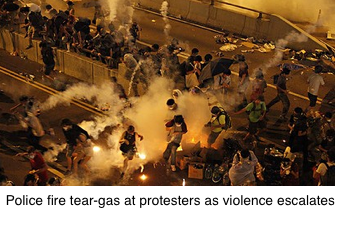What's wrong with the discourse surrounding Occupy Central
- Oct 1, 2014
- 3 min read
Recently during a school activity, students were instructed to divide themselves into three lines as per their opinion on the Occupy Central issue, a movement that aims to pressurize the PRC government into granting universal suffrage to Hong Kong by mobilizing sit-ins in key financial districts. To the left of the room were people who disagreed with the movement, to the right were those who supported it, and to the middle were students that considered themselves ‘neutral’.
Had this question been asked to me a few weeks ago, I would have been standing in the ‘disagree’ line in an instant. Freedom and democracy are values that I support, but I did not believe that Occupy Central was the way to go about achieving it. I did not believe that the demands and goals of the movement were realistic, thinking it unlikely for Beijing to concede universal suffrage to Hong Kong, given that it may act as a precedent for other Chinese regions, as well as undermining China’s own political strength and ability to control our city.

However, after witnessing the treatment of the protesters by the police, my opinion towards the movement shifted considerably. Regardless of political motives, I believe in the idea of proportionate action and force. You can read about it from a more legalistic perspective here (and I encourage you to do so, it’s a very well-written piece), but essentially I do not think the police had the right to exercise the same, blanketed amount of force on frontline protestors who did not necessarily pose a threat (not all those who were stung by the gas/pepper spray actually threw objects at the police), and that the force used was quite frankly disproportionate to the ‘crimes’ being committed.
I began to view the movement as a platform to raise awareness about the issue (including the illegitimacy of the police’s use of force) as well as a means to showcase the solidarity and civility Hong Kong citizens can display while practicing civil disobedience. Although I do not actively endorse the OC movement because of the aforementioned reasons, I cannot say that I oppose the principal justification either.
So I remained standing in neutral line. But when a student leader announced that they hoped that we had moved from the middle row to either the ‘for’ or ‘against’ sides, and had formed a conclusive opinions on the issue, I began to question the nature of discourse that surrounds Occupy Central.

A mistake I think we all make with the OC movement is to assume that neutrality and apathy are synonymous. While I absolutely appreciate society’s attempts to engage us in this very important decision, I don’t think it is right to favor opinions that are more polarized. I have chosen to remain politically neutral and not attend the protests. By no means do I consider this decision to be absolute; I am by no means a political expert, and welcome any further discussion on the issue. But for now, this is the educated and researched opinion that I have formed, and it is by no means a result of political apathy or disinterest.
Moreover, not only is favoring polarized opinions unreasonable, it is harmful as it encourages the generalization of certain groups of people. It is important to acknowledge that policemen, protesters and bystanders are not all the same. All actors do not behave the same way; much like generalizing the neutral as apathetic, it causes valuable voices to be sidelined and negates from the reality of the situation.
I am extremely grateful that our school and our society provides us with the privilege to discuss openly and freely about an issue so relevant to our city today. But in the future, the nature of discourse must shift considerably in order to account for the complexity of the issue at hand, and we must acknowledge that it is possible for someone to remain opinionated, engaged and neutral at the same time.
By Sarika Mahbubani



















Comments